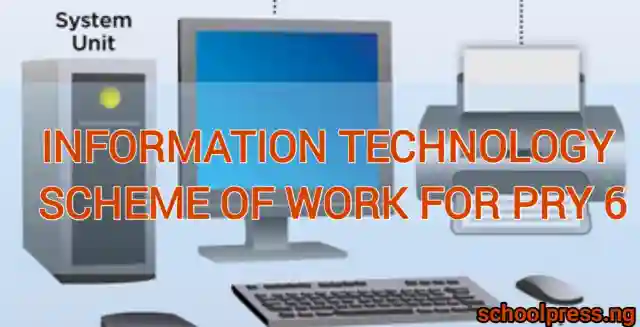Today, technology is rapidly advancing, and it is crucial to provide young learners with skills and knowledge vital for living in a digital world.
The Basic Technology Scheme of Work Primary 2 offers such opportunities. This scheme was developed for a group of 5-6-year-old pupils, and it is the basis for the development of pupils’ skills in technology.
The scheme is divided into three terms, each with its specific objectives and learning outcomes.
First term, the pupils will be introduced to clay, its meaning, and how to prepare it to mould from scratch. Additionally, the pupils will learn how to mould entirely different types of objects from the clay.
Second term, the pupils will be introduced to the meaning of energy and will identify the sounds from different sources.
Lastly, in the third term, pupils will learn about musical instruments and how they work. Construction of their local instruments is key to learning.
As the scheme progresses, pupils will enhance their problem-solving abilities, critical thinking, and creativity. They will additionally analyze how to operate well with others and as part of a group.
Teachers will promote the scheme’s goals and objectives. They will create an ideal learning setting to support active student engagement and inquiry. Likewise, they will provide feedback that benefits the student.
Table of Contents
Objectives of Basic Technology Scheme of Work for Primary 2
First Term Objectives
Week 1-2: define clay
Week 3-6: Prepare clay for moulding
Week 8-10: Use clay for moulding
Second Term Objectives
Week 2-3: State the meaning of energy
Week 4-6: Identify different forms of energy.
Week 8-10: Identify different sounds.
Third Term Objectives
Week 2-4: Name some instruments that produce sounds
Week 5-6: Make local instruments that produce sounds
Week 8-10: Make different kinds of sounds with the instruments they made
Read More: 2024 JAMB UTME Form: Know The Important Information For The Exam Registration
Learning Outcomes of Basic Technology Scheme of Work for Primary 2
First-Term Learning Outcomes
Week 1-2: State the meaning of day
Week 3-6: Prepare clay for moulding
Week 8-10: Mould objects using clay
Second Term Learning Outcomes
Week 2-3: State the meaning of energy
Week 4-6: Mention different forms of energy.
Week 8-10: Identify sounds made from different sources and Make sounds with different parts of their bodies
Third Term Learning Outcomes
Week 2-4: List three instruments that produce sounds
Week 5-6: Make local instruments that produce sounds and Produce sounds with the local instrument made
Week 8-10: Make a sound with the musical instruments
Read More On Primary 2 Scheme of Work
Basic Science Scheme of Work for Primary 2
Physical Health Education Scheme of Work for Primary 2
Information Technology Scheme of Work for Primary 2
Cultural And Creative Art Scheme of Work for Primary 2
History Scheme of Work for Primary 2
Mathematics Scheme of Work for Primary 2
Social Studies Scheme of Work For Primary 2
Civic Education Scheme of Work for Primary 2
Christian Religious Studies scheme of work for Primary 2
Islamic Religious Studies Scheme of Work for Primary 2
First Term Basic Technology Scheme of Work for Primary 2
| WEEK | TOPIC | CONTENT |
| 1 | Revision | |
| 2 | Clay | Meaning of clay |
| 3-6 | Clay | Preparation of clay for moulding |
| 7. | Mid Term Test | |
| 8-10 | Clay | Moulding with clay |
| 11. | Revision | |
| 12 & 13 | Examination |
Second Term Basic Technology Scheme of Work for Primary 2
| WEEK | TOPIC | CONTENT |
| 1 | Revision | |
| 2-3 | Form of Energy (Sound) | Meaning of energy |
| 4-6 | Form of Energy (Sound) | Forms of energy |
| 7. | Mid Term Test | |
| 8-10 | Form of Energy (Sound) | Sound Energy |
| 11. | Revision | |
| 12 & 13 | Examination |
Third Term Basic Technology Scheme of Work for Primary 2
| WEEK | TOPIC | CONTENT |
| 1 | Revision | |
| 2-4 | Form of Energy (Sound) | Sound energy -Things that produce sounds |
| 5-6 | Form of Energy (Sound) | Making local instruments that produce sounds |
| 7. | Mid Term Test | |
| 8-10 | Form of Energy (Sound) | Musical instruments |
| 11. | Revision | |
| 12 & 13 | Examination |
Teacher’s and Pupils Activities
First Term Teacher’s and Pupil’s Activities
Week 1-2: The teacher should Explain the meaning of clay. The pupils should Participate in class discussion
Week 3-6: The teacher should Explain the stages of using and preserving clay and Assist pupils in preparation. The pupils should List the stages of using and preserving clay
Week 8-10: The teacher should assist pupils in moulding different objects with clay. The pupils should Make objects using clay
Second Term Teacher’s and Pupil’s Activities
Week 2-3: The teacher should explain the meaning of energy. The pupils should Participate in class discussion
Week 4-6: The teacher should Guide pupils to identify different forms of energy. The pupils should Participate in class discussions
Week 8-10: The teacher should discuss sounds and lead pupils to identify sounds. The pupils should
Third Term Teacher’s and Pupil’s Activities
Week 2-4: The teacher should Use the chart to guide pupils to identify different instruments that produce sounds. The pupils should Identify and name instruments that produce sound
Week 5-6: The teacher should Guide pupils to make local instruments that produce sounds. The pupils should Construct local instruments that produce sounds from available materials
Week 8-10: The teacher should Use the chart to guide pupils to identify different instruments that produce sounds. The pupils should Play games with sound using the musical instruments
Conclusion
The Basic Technology Scheme of Work for Primary 2 is relevant as it equips pupils with digital skills and knowledge. Teachers should effectively implement the scheme of work and ensure that the learners have a good learning environment.
In addition, teachers should focus on giving feedback that aids in the development of the learners. Overall, the teachers will be playing an essential role in helping develop the new generation of learners in the wake of an era where technology is key.
Read More: The Current Official List Of UNN Courses & Programmes






